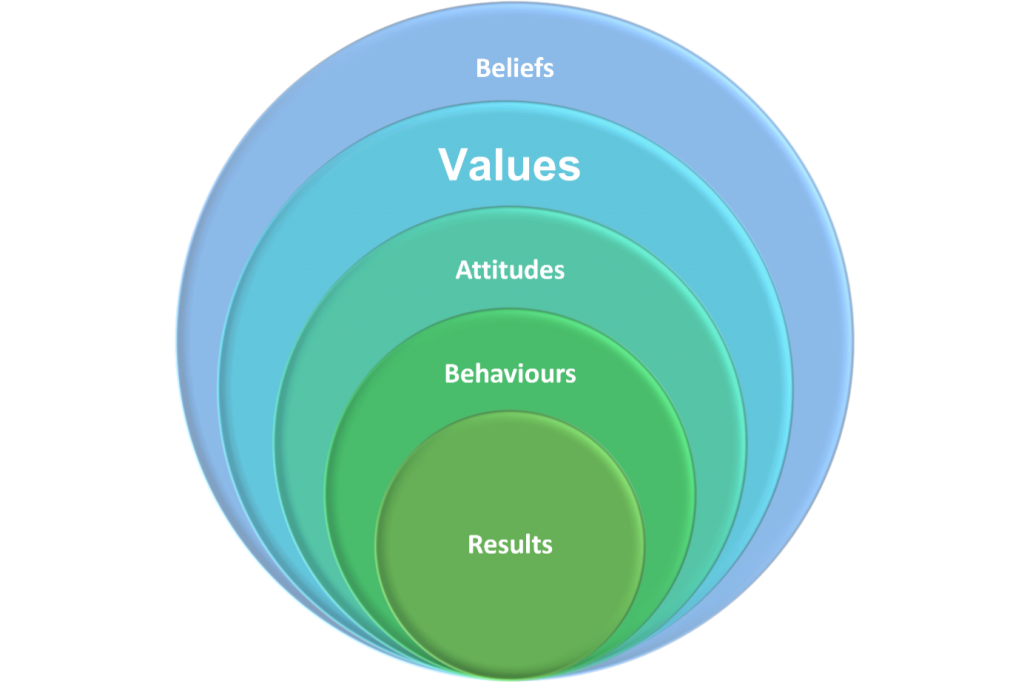There is a growing demand for employers to demonstrate their values and ensure that their employees do the same.
Savvy employers know that technical skills can be trained but alignment with values is harder to teach. Therefore, values need to be assessed alongside skills as people apply to join their organization.
A poor hire can have a significant effect on team morale and add costs to organizations through behaviour management, staff turnover and subsequent recruitment. Values are an important element to assess to ensure new hires bring attitudes and behaviours that align with those promoted within the organization.
However, employers often focus on assessing outcomes in the interview. These can be a good indication of role performance, but don’t tell the whole story.
Employers need to dig deeper to identify the values (and beliefs) that drive behaviours and outcomes – and career professionals need to help prepare jobseekers for these lines of inquiry.

Why values matter
Similar outcomes can be driven by a range of values. For example, a financial analyst may be driven by a value of “competition” or “service” or “value creation.” Any of these may result in high-quality work outputs, but the driving value will make a difference in other workplace behaviours that may have a positive or negative effect on the team culture. This will also be affected by the existing team culture.
Many organizations express their culture through a values statement, but these can be perceived as lofty, unachievable or ambiguous. This can create challenges for organizational leaders, such as:
- Difficulty gaining buy-in and instilling a commitment to core values in the workforce.
- The language used to describe their values can feel uncomfortable or ill-fitting to the individual and they may feel disingenuous talking about how they “inspire” or “innovate,” leading to poor-quality applications.
- Confusion around the meaning of the values and how they are applied may lead to imperfect assessment of applications and misaligned behaviours demonstrated after hiring.
Helping individuals authentically express work values
At Strategic Career Management, we help people learn how to speak from a place of authenticity, communicate their values and identify how they reflect those of the organization.
We’ve been working with internal applicants within a large organization undergoing significant cultural change, where values are central to their recruitment process and organizational development. We have helped applicants demonstrate their alignment with organizational values throughout the application process, particularly in written applications and interviews.
Applicants often feel confused and challenged in finding their authentic voice. Faced with the task of responding to values-based or values-embedded selection criteria or interview questions, many feel uncomfortable and counterfeit.
This challenge has two roots. First, applicants believe they need to throw buzzwords into their applications to hit the mark. Second, they have difficulty articulating their personal values and identifying how these drive their attitudes, actions and ultimate outcomes.
Taking a three-step, person-centred approach, we support applicants to:
- elicit their own personally held values
- identify the link between the values and how these drive their behaviours and workplace outcomes through storytelling
- establish a link between their own values and those of the organization in language that feels authentic for them
What we do
The first step is a personal values assessment, identifying the top 10 values that are relevant to them. The applicant then expands on what each value means to them personally. Through a series of steps, the applicant will refine their list down to two overarching values and build a succinct values statement that is individualized and authentic.
We guide applicants to consider how their identified values drive their behaviours, thinking and attitudes and how these connect to the types of behaviours the organization describes under each of their organizational values. This makes the organizational values more concrete and builds a genuine connection between individual and organization.
We then coach applicants to develop skills to clearly demonstrate their values in application and interview responses. This comes down to good storytelling that incorporates the task/process/action elements and includes qualitative, values-based elements.
Our applicants then identify a workplace success story. Through a guided process, applicants reflect on the “why” of their decision-making and actions and how their personal values drive these.
Taking applicants through these exercises results in:
- Understanding of personal drivers
- Effective articulation of values and how they shape thinking and actions
- Understanding how individuals approach challenges and achieve outcomes differently
- Ability to use an authentic, original voice to tell their stories
- Describing their personal brand
- Increased confidence in articulating their value proposition in applications and interviews in a way that is singular and presents a solid case for why they are a good fit for the role
Ultimately, identifying workplace values increases each applicant’s understanding of how their actions, attitudes and behaviours are driven by these values.
This leads to increased ability to communicate the qualitative elements of their unique stories. This starting point builds capacity to outline the rationale for decisions made, actions taken and their personal approach to overcoming challenges.
From here, applicants can better demonstrate their uniqueness in even highly structured or process-oriented work environments where previously they believed there was little opportunity to differentiate themselves.
The depth and richness of the stories, the level of detail shared and the angle from which the stories are told are personal, interesting, value-laden and allow people to stand in their own space to describe what they did, why they did it and how it made a difference.
This helps improve applicant confidence in facing all elements of the selection process. In some cases, it has also helped people appreciate they were in, or applying for, the wrong job! Our applicants overwhelmingly found the new approach liberating and confidence building, leading to highly personalized, targeted and effective applications.
From an organization’s perspective the benefits are manifold.
A workplace built on aligned values results in a workforce with a stronger connection, higher commitment and increased loyalty. This contributes positively to building happier workforces. Giving due consideration to values is a win for all.





